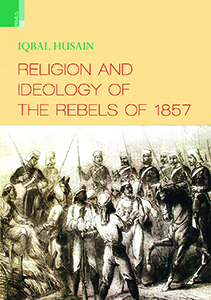
INFORMATION
- AUTHOR : Iqbal Husain
- HB ISBN : 978-93-80607-48-1
- Year : 2013
- Extent : x + 218 pp.
- Discount available on checkout
- Usually dispatched within 3 to 5 working days.
Religion and Ideology of the Rebels of 1857
| HB ₹ 850 . $ . ₤ |
PB ₹ . $ . ₤ |
|
| POD ₹ . $ . ₤ |
e-Book ₹ . $ . ₤ |
INFORMATION
- AUTHOR –
- ISBN – 978-93-80607-48-1
- Year – 2012
- Extent: 400 + 40 coloured illustrations
- 10% discount + free shipping
- Usually dispatched within 3 to 5 working days.
The revolt of 1857 was the first and the largest anti-colonial movement to have occurred in South Asia during the nineteenth century. However, the precise nature of that movement is still keenly debated by historians, statesmen and politicians. Sir John Kaye and G.B. Malleson regarded it as a mutiny, which some Indian historians called it the first war of independence. R.C. Majumdar asserted that it was neither a war of independence nor national in character. Most of these studies, however, rely almost exclusively on official sources that present the imperial point of view. The indigenous perspective, in particular the voice of the rebels, has been ignored in these studies. Departing from the dominant historiographical position, Religion and Ideology of the Rebels of 1857 seeks to understand the ideological elements which formed the background to the rebellion and in doing so brings to light largely unexplored sources such as the proclamations of the rebels and their sympathizers and the correspondence they carried out amongst themselves. Written in Urdu and Persian, these sources have generally escaped the attention of historians. Reinterpreting the revolt by concentrating on Delhi, Ruhelkhand and Awadh, the centres of encounters with the English, this volume asserts that 1857 was not a mutiny but involved the masses, making it a national war against an alien ruler. It also suggests that the rebels’ stress on the unity between the Hindus and Muslims and their joint fight against an alien ruler, paved the way for the emergence of the national struggle for freedom and of a secular India after independence.
The Author
Iqbal Husain was Professor, Centre of Advanced Study in History, Aligarh Muslim University. He is the author of The Rise and Decline of the Ruhela Chieftaincies in 18th Century India (1995) and has edited Karl Marx on India (2006).
The revolt of 1857 was the first and the largest anti-colonial movement to have occurred in South Asia during the nineteenth century. However, the precise nature of that movement is still keenly debated by historians, statesmen and politicians. Sir John Kaye and G.B. Malleson regarded it as a mutiny, which some Indian historians called it the first war of independence. R.C. Majumdar asserted that it was neither a war of independence nor national in character. Most of these studies, however, rely almost exclusively on official sources that present the imperial point of view. The indigenous perspective, in particular the voice of the rebels, has been ignored in these studies. Departing from the dominant historiographical position, Religion and Ideology of the Rebels of 1857 seeks to understand the ideological elements which formed the background to the rebellion and in doing so brings to light largely unexplored sources such as the proclamations of the rebels and their sympathizers and the correspondence they carried out amongst themselves. Written in Urdu and Persian, these sources have generally escaped the attention of historians. Reinterpreting the revolt by concentrating on Delhi, Ruhelkhand and Awadh, the centres of encounters with the English, this volume asserts that 1857 was not a mutiny but involved the masses, making it a national war against an alien ruler. It also suggests that the rebels’ stress on the unity between the Hindus and Muslims and their joint fight against an alien ruler, paved the way for the emergence of the national struggle for freedom and of a secular India after independence.
The Author
Iqbal Husain was Professor, Centre of Advanced Study in History, Aligarh Muslim University. He is the author of The Rise and Decline of the Ruhela Chieftaincies in 18th Century India (1995) and has edited Karl Marx on India (2006).




